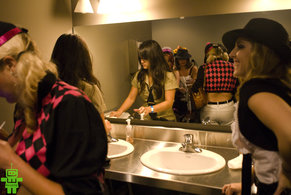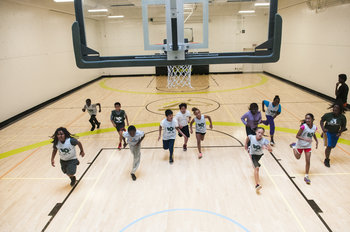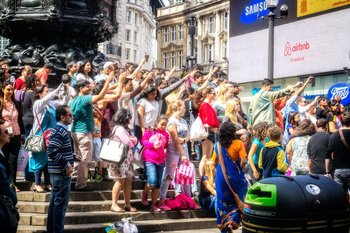
Accepting reasonable criticism graciously. | Acknowledging someone when they talk to you. |
Answering a phone with a greeting such as hello. | Apologizing for mistakes. |
Arriving on time for appointments / meetings / classes. | Asking before inviting a guest to an event you didn't organize. |
Asking before petting someone's dog. | Asking permission before borrowing something. |
Asking permission to use the bathroom in someone else's home. | Avoiding direct criticism of others that is likely to cause embarrassment (loss of face). |
Being honest and candid as appropriate. | Being patient with others. |
Bowing as a sign of respect and acknowledgement (Japan). | Bringing a small offering such as a dessert or beverage when invited into someone's home. |
Clapping to show appreciation for a performance. | Cleaning up after yourself / your pet. |
Cutting your grass / maintaining your property. | Declining a job offer as opposed to ghosting. |
Dressing professionally for your work. | Finishing your plate / not wasting food. |
Gender norms such as the expectation that men not cry / show excessive emotion. (traditional) | Greeting others. |
Having the tact not to be too direct and honest when it is hurtful. | Helping others if they fall down or have a problem. |
Keeping a secret. | Keeping your desk somewhat tidy / clean. |
Leaving tips for good service (e.g. America & Canada). | Listening patiently and respectfully when someone is speaking a second language that is your native language. |
Listening when others talk. | Maintaining a somber atmosphere at a funeral (e.g. not laughing and making jokes) |
Maintaining appropriate space from others. | Maintaining personal hygiene. |
Making eye contact. | Not asking overly personal questions. |
Not bragging / maintaining appearance of humility (cultures such as Japan). | Not bringing your personal problems to work. |
Not bumping into people. | Not disclosing overly personal details. |
Not discriminating. | Not eating loudly. |
Not eating off another person's plate. | Not finishing other people's sentences. |
Not interrupting others when they are speaking. | Not kicking / pulling the seat in front of you an an aircraft. |
Not licking your plate / utensils. | Not looking at other people's phones / screens. |
Not looking at your phone during dinner. | Not looking at your phone when talking to someone. |
Not making a great deal of noise late at night (e.g. not cutting your grass at night). | Not making assumptions about other's abilities (e.g. it would be unacceptable not to invite a disabled coworker to an team event because you assume they wouldn't be able to attend) |
Not making assumptions about people based on appearance (e.g. "How long have you been in America?") | Not ordering expensive items when someone else is paying. |
Not pointing at others. | Not putting elbows on dinner table (American traditional etiquette). |
Not putting feet up on furniture (particularly in someone else's home). | Not slamming doors. |
Not spitting in public. | Not spreading rumors. |
Not staring at others. | Not swearing. |
Not talking / making noise in a movie theatre. | Not talking about money (a norm in some countries such as Japan) |
Not talking about people as if they were not there (e.g. "can he speak English?"). | Not talking about politics at work / to customers (traditional norm). |
Not talking loudly on the phone in public. | Not talking with your mouth full. |
Not trying to impose your norms when travelling (e.g. not tipping in a country that has no culture of it) | Not using all caps in messages / emails. |
Notifying someone if you need to cancel or will be late. | Notifying your employer / school if you will be absent. |
Offering words of condolence at a funeral. | Opening a gift in front of the person who gave it to you (expected in some cultures, rude in others). |
Proper use of cutlery when eating. | Remaining civil in an argument. |
Remembering other people's names or apologizing if you forget. | Removing shoes before entering a home (common cultural norm). |
Replying to messages from others. | Returning borrowed items. |
Returning shopping carts to the corral. | Saying please when making a request. |
Shaking hands when meeting someone for the first time. | Showing interest when others talk. |
Speaking quietly in a library. | Speaking slowly and using simple words when you are using English in a foreign country. |
Taking turns. | Thanking people for kindnesses. |
Treating people with respect regardless of their position (e.g. being as polite to your garbage collector as your neighbor) | Trying to accept apologies graciously. |
Trying to learn a few words of the local language when traveling. | Using polite language when addressing a customer. |
Waiting in lines. | Waking in the morning and sleeping at night. |
Wearing activity appropriate clothing (e.g. exercise clothing when jogging). | Wearing clothing. |
Wearing formal clothing to a formal event. | Wearing shoes in a restaurant. |
Social Norm vs Social Rule
A social norm is an informal element of culture that respects the intelligence of members of a group to conform as they see fit. Non-conformance to norms may damage an individual's relationships with group members or it may be tolerated. A social rule is a formally defined restriction on social behavior such as a regulation or law. These are generally associated with some type of penalty. Unlike social norms, social rules are a form of control whereby some behavior is seen as so serious that systems such as a society, government department, organization or institution need to prevent it. Where norms become rules they cease to be culture.Generation Gap
Norms change with time to adapt to social conditions, values, lifestyles and other factors such as technology. This creates a generation gap in norms. For example, language or practices that were once perfectly acceptable that are viewed as norm violations by younger generations such that older generations are expected to continually adapt to culture change.Respect
Norms mostly relate to respect. That is to say that there may be no penalty for violating a norm other than a loss of respect from those who value the norm. Violation of norms also can lead to social exclusion.Individualism
Norms facilitate social harmony and conformity at the expense of individual freedom. As such, in any group some individuals will view a particular norm as unnecessary, unhelpful or oppressive. However, all groups have norms such that countercultures that reject mainstream norms tend to adopt many of their own norms.| Overview: Social Norm List | ||
Type | ||
Definition | A shared understanding of how one is expected to act. | |
Related Concepts | ||
















































